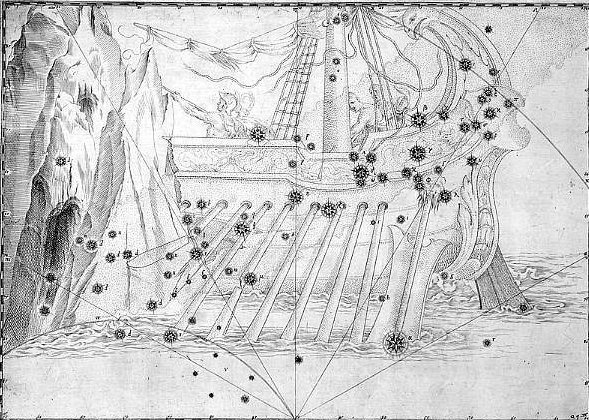The Bright Fire (λ Cancri) could be alluded to in Ga3-3, drawn like a 'bird of fire' - a rooster crying out at early dawn (moa ohoa):
Dry land (light) is the opposite of sea (darkness) and gravitation draws water downwards. Therefore the high sky of midsummer should correspond to 'land' and the low sky in midwinter to 'sea'. Probably heliacal Adara and Muliphein (ε and γ Canis Majoris) were stars which once upon a time announced high sky ('land') ahead - although precession had moved their positions from spring ('dawn') to 'noon' (midsummer):
When in rongorongo times the star watchers on Easter Island saw Ascella and Nunki close to the Full Moon it could have meant 'dawn' had arrived. It was not spring equinox but the beginning of the halfyear which began when 'land was fished up' from the deeps of midwinter. July 24 was 5 * 5 * 5 days after autumn equinox (and 72 * 4 = 12 * 24). In Manuscript E the explorers caught a multitude of fishes with their bare hands and threw them up on land. Then, when they should have a feast they discovered they had no fire: ... Again they went on and reached Hanga Hoonu. They saw it, looked around, and gave the name 'Hanga Hoonu A Hau Maka'. On the same day, when they had reached the Bay of Turtles, they made camp and rested. They all saw the fish that were there, that were present in large numbers - Ah! Then they all went into the water, moved toward the shore, and threw the fish (with their hands) onto the dry land. There were great numbers (? ka-mea-ro) of fish. There were tutuhi, paparava, and tahe mata pukupuku. Those were the three kinds of fish. After they had thrown the fish on the beach, Ira said, 'Make a fire and prepare the fish!' When he saw that there was no fire, Ira said, 'One of you go and bring the fire from Hanga Te Pau!' One of the young men went to the fire, took the fire and provisions (from the boat), turned around, and went back to Hanga Hoonu. When he arrived there, he sat down. They prepared the fish in the fire on the flat rocks, cooked them, and ate until they were completely satisfied. Then they gave the name 'The rock, where (the fish) were prepared in the fire with makoi (fruit of Thespesia populnea?) belongs to Ira' (Te Papa Tunu Makoi A Ira). They remained in Hanga Hoonu for five days ... A 'common ground' between a Crab (Cancer), a Lobster, a Turtle etc is the absence of hair, feathers, or other features of cover (which circumstance could make the creature shiver, papapapa). Instead they have an exosceleton - with the upper carapace like a flat rock (papa). On Easter Island the Cancer constellation could have been compared to a Turtle.
... In the beginning were Rangi and Papa, Sky and Earth. Darkness existed. Rangi adhered over Papa his wife. Man was not. A person arose, a spirit who had no origin; his name was Rangitokona, the Heaven-propper. He went to Rangi and Papa, bid them go apart, but they would not ... Before there could be a Bright Fire there should be a pile of wood, which could explain the name of μ Cancri (Heap of Fuel, cfr Ga2-28). This Greek letter indicates there could not have been any light - because there was water here, μ:
Neither could there have been any light at Tegmine, in the following night, because the name means 'In the Covering' (according to Allen). The end (of water) ought to have arrived with Al Tarf, where the 'bird of fire' (manu kake) was able to climb up. However, according to Manuscript E the fire had to be fetched from the ship (drawn up on the beach of Hanga Te Pau at the dark southern side of the island). This ship of the explorers could allude to Argo Navis, which had 'fire' at its stern, because the left of its twin rudders was 'governed' by Canopus:
... The Pythagoreans make Phaeton fall into Eridanus, burning part of its water, and glowing still at the time when the Argonauts passed by. Ovid stated that since the fall the Nile hides its sources. Rigveda 9.73.3 says that the Great Varuna has hidden the ocean. The Mahabharata tells in its own style why the 'heavenly Ganga' had to be brought down. At the end of the Golden Age (Krita Yuga) a class of Asura who had fought against the 'gods' hid themselves in the ocean where the gods could not reach them, and planned to overthrow the government. So the gods implored Agastya (Canopus, alpha Carinae = Eridu) for help. The great Rishi did as he was bidden, drank up the water of the ocean, and thus laid bare the enemies, who were then slain by the gods. But now, there was no ocean anymore! Implored by the gods to fill the sea again, the Holy One replied: 'That water in sooth hath been digested by me. Some other expedient, therefore, must be thought of by you, if ye desire to make endeavour to fill the ocean ... We should observe the Turtle among the stones and sea-shells at bottom right in the picture. | |||||||||||||||||||||||||||||||||||||||||||||||||||||||||||||||||||||||||||||||||||||||||||||||||||||||||||||||||||||||||||||||||||||||||||||||||||||||||||||||||||||||||||||||||||||||||||||||||||||||||||||||||||||||||||||||||||||||||||||||||||||||||||||









